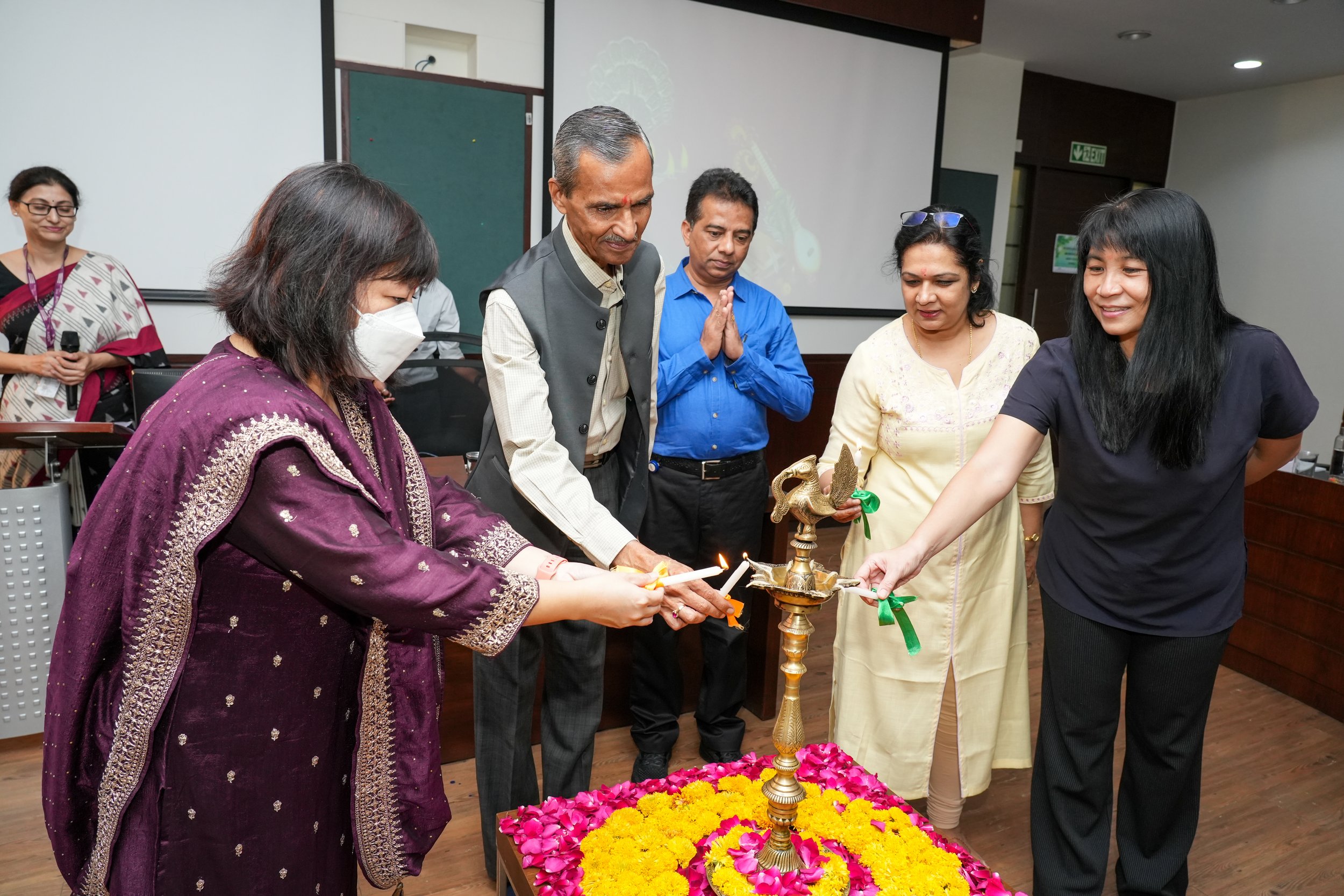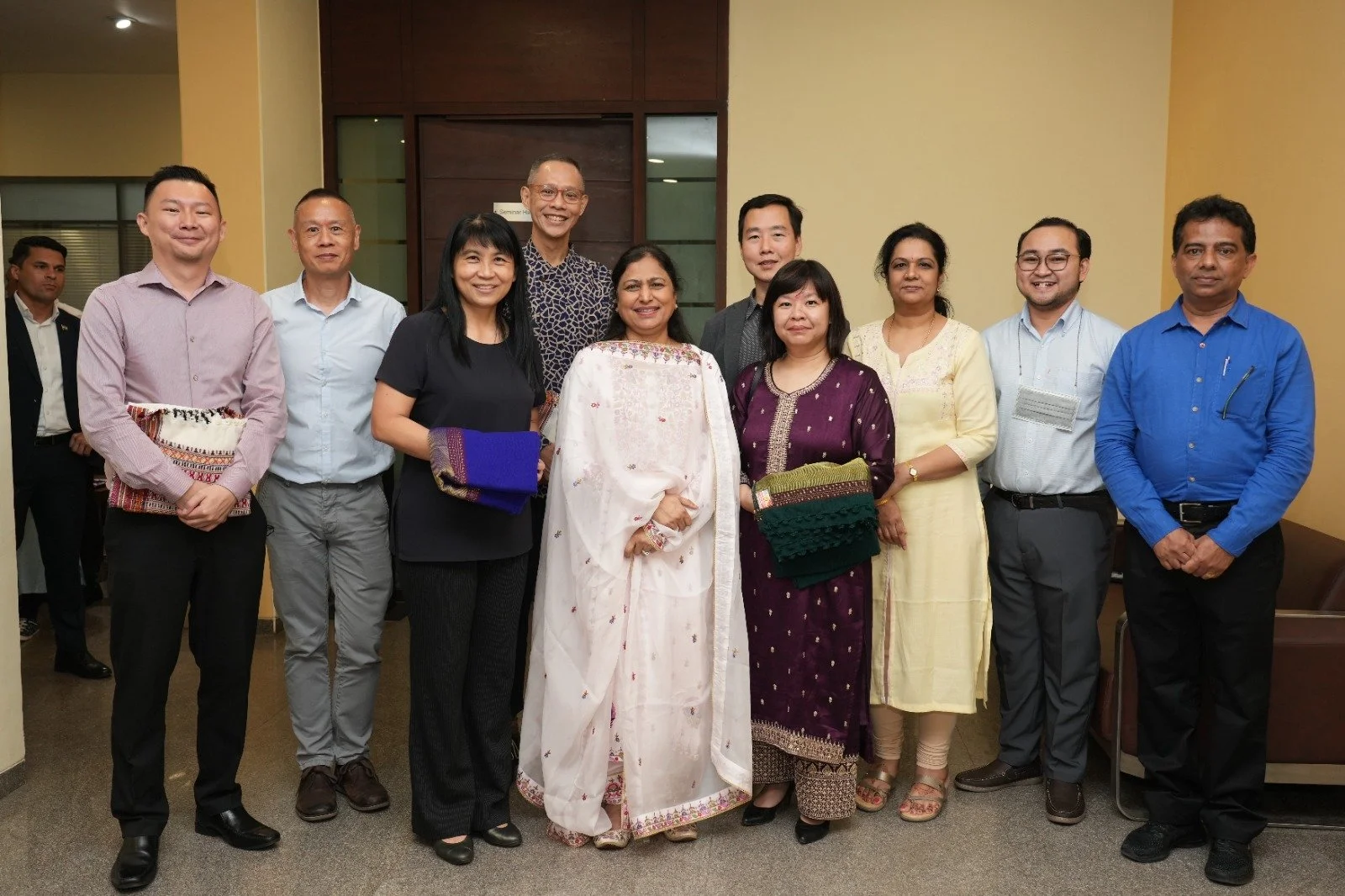STEM Leadership Programme in India
Temasek Foundation, Adani Foundation and the National Institute of Education partner in a STEM Leadership Programme to develop an integrated STEM model for Adani schools. This partnership will span across three years and over six phases. The Multi-centric Education, Research and Industry STEM Centre at the NIE is leading in this partnership with a team of STEM curriculum experts with experience in STEM curriculum design, implementation, evaluation, assessment and research.
Programme Highlights
2023
2024
2025
Baseline Study & Workshop
In the first Phase of this Programme, a baseline study and workshop were carried out in Gujarat, India on 14-16 April 2023. 39 teachers from 7 Adani schools, namely, Adani Public School, Mundra (APS), Adani Vidya Mandir Ahmedabad (AVMA), Adani Vidya Mandir, Salhi (AVMS), Ambuja Vidya Niketan Ambujanagar (AVNA), Ambuja Vidya Niketan, Upparwahi (AVNU), Adani World School (AWS), and NRC School, Mohone (NRC), participated in a three-day workshop that develops their foundational understanding of integrated STEM curriculum. A baseline focus group discussion with key representatives overseeing infrastructure, cybersecurity, and green energy businesses in Adani Group was conducted. Great insights were obtained on the types of 21st century competencies that STEM industrialists seek when hiring employees. Further understandings from lesson observations and interviews in August 2023 will deepen our understandings of the Adani schools and inform our curriculum work in designing the materials, tools, and frameworks to guide future STEM teaching, learning, assessment, and evaluation.
Observation of Classes
August 7 – 11, 2023
The continuation of the first phase of the programme was carried out in two schools – Adani Vidya Madir in Gujarat and NRC School, Mohone in Mumbai. As part of the ongoing creation of a STEM Framework anchored in the Indian context, NIE consultants observed classrooms in their implementation of monodisciplinary and interdisciplinary classes. Aside from conducting interviews with students, NIE consultants also conducted teacher interviews so as to deepen their understanding of Adani schools and be better equipped to help the teachers design the materials, tools, and framework needed in conducting a STEM lesson.
Adani Vidya Mandir, Ahmedabad (August 7 – 8, 2023)
Adani Vidma Mandir was established in 2008 to provide free education to underprivileged children. There are three AVM schools in India, and they are located in Gujarat, Chhattisgarh and Andhra Pradesh respectively. The schools take care of the uniforms, transportation, and meals for the students, as well as the materials that will be used by teachers in the classroom.
The teachers who were observed were Dr Anamika Jha (Biology), Ms Viral Thakkar (Chemistry), Ms Shweta Khakhkahr (Physics) and Ms Sanjana Jyotishi (Biology).
NRC School, Mohone (August 10 – 11, 2023)
NRC School was set up in 1950 and is currently under the management of Adani Foundation. The school will also be rebranded by next year and will take on the Adani name. NRC School has two teaching mediums – English and Marathi. English school is scheduled in the morning, while Marathi school is in the afternoon. The school offers pre-primary, primary, and secondary.
The teachers who were observed were Ms Pearl Peter (Science) and Ms Aishwarya (Physics).
Development of the Integrated STEM Curriculum Framework
January — August 2024
After the baseline scan and class observations, the NIE team developed and proposed a pedagogical framework for the Adani schools. This phase was divided into two parts. The first part was to introduce the new pedagogical practices framework to the teachers and to gather feedback from them. The NIE team created a comprehensive module on food security, followed by a review session to reinforce learning and address any challenges. The second part builds on this foundation, introducing a new module on water scarcity. The second part brought in additional teachers to broaden the programme’s reach and includes immersive learning journeys to local STEM industries, allowing educators to connect theoretical knowledge with real-world applications in food and water resource management. The teachers, after each training, went back to their school to echo what they had learned. They were given an opportunity for feedback sessions. The feedback session comprised an online Zoom meeting with each school's teachers and the NIE consultant. The focus was to clarify the lesson plans submitted and to suggest alternative ways to refine their lesson enactment. After, the teachers recorded their lessons and submitted them to the NIE consultants for another round of feedback and review on the lesson enactment.
29 January 2024 – 1 February 2024 | Ahmedabad, India
The NIE team conducted a four-day STEM leadership training anchored on the proposed STEM pedagogical framework. The workshop aims to present the framework to the teachers and allow them to experience it firsthand while providing feedback and suggestions to develop the proposed framework further. The programme started with the sharing of the teachers' observations from Phase 1 (AVMA and NRC English School) and the NIE team providing feedback on what transpired in the observation. It was further supported by the presentation of the STEM Pedagogical Practices framework and video analysis of different video segments from the teacher's observation. To help the teachers understand how the framework is used in the classroom, the NIE team enacted a STEM lesson while providing an explanation for each part of the lesson. The Adani teachers also had the chance to teach in the classroom using the same topic to actualise what they had learned in the workshop. This phase ended with a feedback and reflection session to wrap up this phase.
29 July to 1 August 2024 | Adani Public School, Mundra
The NIE consultants went to Gujarat, India, to enact and introduce the second module on water scarcity. This was attended by the seven schools. This workshop included instruments for the proposed framework evaluation, such as a lesson observation protocol, diagnostics for STEM teacher competency, and students’ STEM process skills, which were piloted, used, and refined after the workshop concluded. The teachers also tested the second module with classes in Adani Public School. Post-lesson feedback was provided to the teachers, and interviews were conducted with the teachers and selected students to obtain deeper insights into their teaching and learning experiences and understanding. Along with this training, they included different learning journeys to the STEM industries of Adani Foundation. At the end of the workshop, participants were provided with the deliverables for the next phase of the programme involving the symposium.
STEM Symposium
17 - 19 February 2025
The Adani teachers were provided a platform through the symposium to consolidate their takeaways from the previous phases and apply the STEM pedagogical and teaching strategies they have acquired. The first part of the symposium involves a series of lesson presentations of original lesson plans developed by each of the seven Adani schools. The second part involves a consultation session with the Adani teachers on developing their lesson plans into a book chapter.
The symposium was attended by the seven Adani schools and 20 selected teachers from Ahmedabad city government schools. The teachers were invited to the symposium as part of earlier cascading efforts and to learn more about STEM education. Each of the Adani schools presented three original STEM lesson packages. The NIE consultants evaluated the first round of lesson presentations as part of the symposium competition, while the remaining two rounds of non-competition lesson presentations were jointly evaluated by the NIE consultants and fellow Adani schools as part of a peer evaluation initiative. Q&A sessions were conducted after each presentation to facilitate discussion and allow for interactive feedback. After the presentations, the teachers were guided on how to restructure their lesson plans into a book chapter to be featured in a forthcoming academic book to be published.
The symposium was successfully implemented. The participants were able to present their own original lesson plans and receive feedback from the NIE consultants. At the end of the symposium, participants were provided with details on the deliverables for the academic book chapter and updates on the subsequent programme phases.
Co-Enculturation of STEM Expertise in Singapore
7 — 11 July 2025
From 7 to 11 July, 15 Indian delegates visited Singapore for a STEM Co-Enculturation Workshop, celebrating the completion of the Integrated STEM Model in Gujarat, India programme. The visit marked the culmination of a three-year journey, with delegates recognised as STEM Master Trainers and their schools honoured as Centres of Excellence in STEM Education. Highlights included a micro:bit coding workshop, Gardens by the Bay, and visits to schools, Science Centre Singapore, and GreenLoopFarms—demonstrating STEM’s real-world impact on sustainability and education.








































